
Author of Science Fiction books such as Gridlinked (described by SFX as 'A boiling brew of red-in-tooth-and-claw turbo cyberpunk.') and The Skinner ('Phantasmagoric SF that few aficionados will want to put down' - The Good Book Guide) Neal Asher has firmly staked his pitch in the major leagues. Here we present an interview with Neal conducted by Paul Kane...
Paul Kane: What - and who - would you say have been your biggest cinematic, televisual and fictional influences as you've developed as a writer?
Neal Asher: A more complicated question than it seems, because different films/books have influenced me at different stages of my life - as with anyone I guess. When I was a kid I hid behind the sofa from the Daleks, and later I was utterly in awe of Star Wars, and now neither of these get my pulse going. I guess the best way to answer is with those titles I will re-read and those films I am prepared to watch time and time again. I'm not pretentious about what I like and I'll not bombard you with the titles of obscure French films, nor spout words like 'noir'. I am an unashamed Arnophile and I love films like Terminator (1&2). Beside the smash 'em up films with him in I'd add to my list Excalibur, Bladerunner, Alien (No. 2 in preference), Krull, and more recently that wonderful film Gladiator. On television I was heavily into Babylon 5, even with its rubber-mask aliens, and considered it a lot less silly than all the Star Trek spin-offs (I want SF not Coronation Street in space). I despair when asked about the fictional influences on me. I look around at the huge collection of SF I have on my shelves and wonder just which ones to pick. In that respect suffice to say that during certain periods of my life I've averaged a reading rate of ten books a month and most of those were SF or fantasy. As I noted in the acknowledgements to The Skinner, the list stretches from Aldiss to Zelazny, but those writers who stand out for me are Banks, A. E. Van Vogt, Terry Pratchett, Cherryh, Tepper, Gene Wolfe, Zelazny, Julian May, and and ... oh bugger, the list just goes on and on.
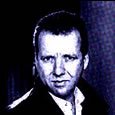
Paul Kane: Your story's an inspiration to all the struggling writers out there. Could you tell those who don't know a little about how you went from writing your first SF and fantasy stories at sixteen, to signing that first three-book deal with Pan-Macmillan?
Neal Asher: About two decades of hard work. I was writing for something like five to ten years before I even got anything published. I saw myself in print for the first time when I discovered the small presses and tried my hand at writing short stories (rather than the epic fantasy trilogy). I also joined a postal workshop (something I advise for any would-be novelist), kept working on my English (went to evening classes and took an A level there). BBR took my first story in '89. Thereafter I just kept writing them, also moving in to writing one or two SF novels and a contemporary one. My first novella was published by club 199 for a one-off payment. It was about 30,000 words long and I'd written it for one of the aforementioned postal workshops. I had to extend it by 10,000 words to fit 199's requirements. My second published novella was the follow-up intended for 199, but was taken by Tanjen. But I'm rambling here. There is no quick fix nor easy route. You have to be utterly committed to what you do and to never give up. During this period I was submitting synopses and sample chapters to all the big publishers and getting forests of rejection letters. The Engineer was published and received good reviews. I started putting reviews in with my samples and synopses. Maybe what cracked it was a full colour copy of a review of that book in SFX (on top of the stack), and that at about the same time I'd set up my first website so the publisher could check out my writing CV. Of course it doesn't end there. You then have to prove you can produce.
Paul Kane: How do you rate your earlier work now? Books such as The Parasite and The Engineer (both published by Tanjen)
Neal Asher: I haven't reread The Parasite for some time, nor that Club 199 book (Mindgames: Fool's Mate), but if they're anything like The Engineer they'll be basically sound in their story telling and gosh-wow factor, but in need of huge amounts of editorial work. I recently did such work with The Engineer as it is being republished by Cosmos Books (publishers of Africa Zero) as The Engineer Reconditioned. What I've done with that is written introductory blurbs for each story and added a few extra tales. But my writing has changed a fair bit over the last four years. This is mainly due to my editor at Tor Macmillan (Peter Lavery), who was in this game when I was still in nappies - some of the greats of SF have seen his pencil marks on their typescripts. And also because in that four years I've churned out something like three quarters of a million words. If you don't learn something doing that you have to be an idiot!
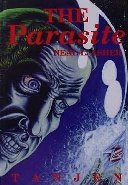
Paul Kane: Do you do a lot of research for your futuristic stories and novels, and how difficult do you find it to predict what might happen in years (or even centuries) to come?
Neal Asher: I do not do a lot of research and essentially what I write is not a prediction. I don't really see in our future a million tonne alien psychopath destroying worlds, nor do I expect the human race to be remotely recognisable to us when it has gone to the stars. My first aim in writing my stories is to entertain and for that I need conflict in my fiction. I feel that the truth of the far future will reveal a boring lack of such. The technical details come as a result of extensive reading -- science magazines, articles, and of course vast quantities of SF. The Internet has now also become an excellent resource. You want to know about Dyson spheres, rail guns, fusion engines? Just type those words into Google and you can get expert slants on those things from all around the planet.
Paul Kane: Do you consider yourself more of an SF/fantasy writer who uses horror, or a horror writer who uses SF or fantasy as a backdrop for his tales? Or do you think the genres are interrelated anyway?
Neal Asher: If anything, the former. All the genres are interrelated but I perfectly understand why publishers classify books like that. It's to get the customers to what they want. If you're an SF, fantasy, or horror reader you will experience huge frustration walking into a bookshop where everything is shelved alphabetically and soon go rushing back to a shop where the books are classified by genre. I do think a lot of rubbish is spouted by some in the literary intelligencia concerning the crossing of genre boundaries - it usually comes from those who do not want to be accused of writing something so demeaning as SF, fantasy, or horror.
Paul Kane: You also write contemporary dramas and TV scripts. Do you see yourself moving more into these areas at some point, or perhaps balancing the two (SF and contemporary) as Iain Banks has done?
Neal Asher: The dramas and TV scripts are on the shelf at the moment. Nothing wrong with those I've written, but why start banging my head against that door while this present door to Tor Macmillan stands open? However, given the time to spare, I may look into some of these other projects. At present I'm about a year ahead of my publisher, but being completely paranoid, that doesn't seem like enough to me. But before I touch the TV scripts etc I'll produce more short stories (for the likes of Asimov's), more novellas (I was recently asked if I could do a collection of three Polity novellas for another publisher). I gave up my day job about two years ago so it's only sensible that I pursue paying markets. A man's gotta eat. For the future though, maybe the film scripts of the books …
Paul Kane: Speaking of which, have any been optioned, and who would you like to see making them if you had a preference? The name Tarantino always crops up in your blurbs and he hasn't tackled Sci-Fi yet…
Neal Asher: Only last year I received a query from my American publisher (Tor - same name as the British one) as to who deals with my film and TV rights. He was asking because someone at a production company called Blue Train Entertainment in Beverly Hills asked him about Gridlinked. After I'd changed my underpants I passed this on to Macmillan (who deal with my rights - I'm an oddity in that I don't have an agent). Nothing came of this, however. But it was promising as Blue Train are serious players, being involved along with Vanguard and Dreamworks in producing the film The Tuxedo (Jackie Chan). After that, just for the hell of it, I mailed off a copy of The Skinner to Stephen Spielberg. It's probably stacked there with the other thousand books he receives each week.
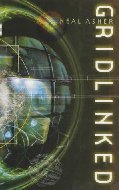
Paul Kane: In an ideal world, who would you like to see playing your hero Agent Cormac?
Neal Asher: Caroline, my wife, being a total 24 addict, would like to see Kiefer Sutherland in the role and actually I now agree…sort of. Though better would be some cold English actor like Jeremy Irons - those that Hollywood delight in casting as arch baddies. But in the end the actors, though important, are nowhere near as important as the director and producer. We've all seen great actors struggling in crappy movies. So, what do you think, Ridley?
Paul Kane: He'd be one of my first choices for any movie! But was Cormac modelled on any personal heroes, fictional or otherwise?
Neal Asher: He's James Bond in space, so I'm repeatedly told. Well, not really. In Gridlinked he's a necessary component in a story and an archetype against which all the other characters are measured. I didn't consciously model him on anyone, and I'm desperately scrabbling here for comparisons. Bits I guess: some James Bond, some Callan, a dash of Clint Eastwood, a measure of Bruce Willis and scrape off the emotion that floats to the top? Nah, he's just Cormac - make of him what you will.
Paul Kane: What's your view on the Internet publishing vs. paper publishing debate? Do you think electronic books will ever replace the real thing?
Neal Asher: Not sure about that one. All the predictions of the demise of the book have come to nought and books are selling as well, if not better, than ever. Some people say that when we have an electronic book that is as convenient as a paper one (i.e. one you can read in the bath or take on the train) the paper book will then decline. I'm not convinced. I like owning books, I like the feel of them, I like to see them on the shelf, I like the covers. But then, what of generations to come? I've seen, in some people's houses, books getting displaced by videotapes ... unsure, I think books will only disappear when the reader does, and that's a distinct possibility.
Paul Kane: You've had stacks of short stories published in the past, some of which were reprinted in your brilliant The Engineer book from Tanjen, which as you say, is to be re-released by Cosmos books. Do you have any plans to bring out any other bumper collections?
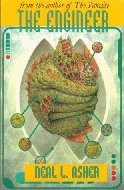
Neal Asher: I will always try to get my work published and re-published. If things go well with Macmillan then I hope they'll bring out collections of my short stories - I keep enough stories to one side for that purpose. Nothing due from them yet
Paul Kane: You're into karate, I gather? What else do you do to unwind at the end of a hard writing day? (and keep it clean)
Neal Asher: : Well, I have to be honest about the karate and let you know that it's been some time since I practised it. It's an excellent non-boring way of keeping fit, but can play hell with your joints. Since becoming a full-time writer I've found that I really need to do something to stop me turning into a huge porker. I cycle and weight train now. As to unwinding, I usually do that with copious amounts of nicotine and alcohol. In the case of the latter I often become completely unravelled.
Paul Kane: For those coming late to your books, could you give a brief run-down on what each one is about, starting with Gridlinked? And explain a little bit about the universe you use as a backdrop.
Neal Asher: : To paraphrase the blurbs…Gridlinked begins where a man's arrival on Samark causes a fusion explosion that kills thousands and annihilates a terraforming project. Agent Cormac is sent to investigate and seek a resolution to the trouble caused. On his trail is a vicious pschopath, with his augmented mercenaries, and the killing machine Mr Crane. Luckily he does have the help of Shuriken, a throwing star with a mind of its own, Golem combat androids, and the ambivalent dracomen. Samarkand has meanwhile descended into frigid cold and sabotage is uncovered, the prime suspect being an alien that called itself 'Dragon' and which apparently destroyed itself twenty-seven years before the event.
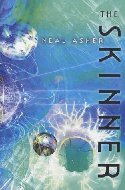
The Skinner is set in the same universe as Gridlinked, but some centuries after. In this three travellers come to the Line planet Spatterjay: Janer brings the eyes of a hornet Hive mind, and an agenda; Erlin comes to find Ambel - the ancient sea captain who can teach her to live; and Sable Keech is a man with a vendetta, though he has been dead for seven hundred years! The world is mostly ocean, where all but a few visitors from the Human Polity remain safely in the island Dome. Outside, the native hoopers risk the voracious appetite of the planet's fauna in their struggle for life and life eternal. Somewhere out there is Spatterjay Hoop himself, and Keech will not rest until he can make this legendary renegade - now transformed into something unspeakable - pay. As the fortunes of these travellers unwittingly converge, all hell erupts in this bewildering waterscape…
The Line of Polity is a sequel to Gridlinked, though you don't necessarily have to read the first to appreciate the second: Outlink station Miranda has been destroyed by a nanomycelium and, because of this method of sabotage, the alien bioconstruct, Dragon, is thought to be involved. Sent on the titanic Polity dreadnought, the Occam Razor, Agent Cormac must investigate again, and resolve the question of Masada, a world about to be subsumed when the line of polity is drawn across it. But the biophysicist Skellor has not been captured, and controls something so potent that Polity AIs are prepared to hunt him down forever, to prevent him using it. On Masada the rebellion can never rise above ground as the slave population is subjugated by orbital laser arrays controlled by the Theocracy in their cylinder worlds, and by the fact that they cannot leave their compounds. Because the wilderness of Masada is without breathable air, and out there roam the monstrous hooders, siluroynes, and the weird and terrible gabbleducks…
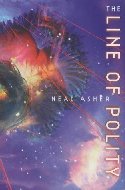
The Polity universe these three books is set in is one where the AIs are in control (thanks Mr Banks), we have FTL spaceships travelling through underspace, and on established worlds instantaneous transmission gateways called runcibles operate. These runcibles are necessarily controlled by AI, and that controlling AI is usually also the planetary governor. Rule is centralized from Earth and the AI called Earth Central (of course). There are separatist organizations who want out from under AI rule and because the majority of the human race are quite comfortable there thank you very much, these people resort to terrorism (because that works, doesn't it?). Outside of the Polity things are a bit more chaotic, what with worlds already inhabited after previous waves of colonization. Also, in my future, there's a lot of life out there, and no shortage of flesh-eating monsters. It is on the whole a wide and rich setting in which I can tell many stories, and fully intend to.
Paul Kane: Cowl came out in hardback last year, which you must be really pleased about. Could you sum up what this one is about too.
Neal Asher: Something different this time, and absolutely nothing to do with the Polity. This is grand scale time travel which concerns the lethal far-future human/creature, Cowl, who has travelled back to the beginnings of life on Earth where he is attempting to change the entire history of the human race; factions of far-future humans beating the living hell out of each other; organic time machines of two different types, one type being scales from the back of a creature called the torbeast - a vast creature controlled by Cowl; a prostitute from our time being dragged back through the eons as a sample of the future; a programmed killer, first hunting her then being given a more important mission; and all sorts of flesh-eating prehistoric monsters (of course). But mainly what I was aiming here for was some essence of the awe a feel at the sheer scale of Earth's history. The fossil you pick up was alive two hundred million years ago; 170 million years of dinosaurs, 65 million years of mammals, and all that time is just an eighteenth of the time life has existed on Earth. Blows your mind: four and a half billion years.
Paul Kane: Finally, what can we look forward to in the near future from Neal Asher?
Neal Asher: Well, Brass Man is out now from Macmillan. This is a follow-up to The Line of Polity and for those who have read Gridlinked the title is a giveaway. That came out in April 2005. The Voyage of the Sable Keech which revisits the world of The Skinner is coming out in 2006. I also intend to produce some Polity novellas and some more short stories. That covers the next two years and brings me to the end of the second three book contract from Macmillan. Beyond that who knows? Kiefer Cormac in the Ridley Scott film Gridlinked? Yeah, then I woke up.
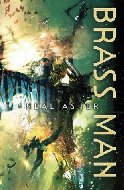
Paul Kane: But what a dream…Thanks very much Neal.
Neal Asher: Thanks Paul.
Neal Asher website:
http://freespace.virgin.net/n.asher
Interview (C) Paul Kane & Neal Asher